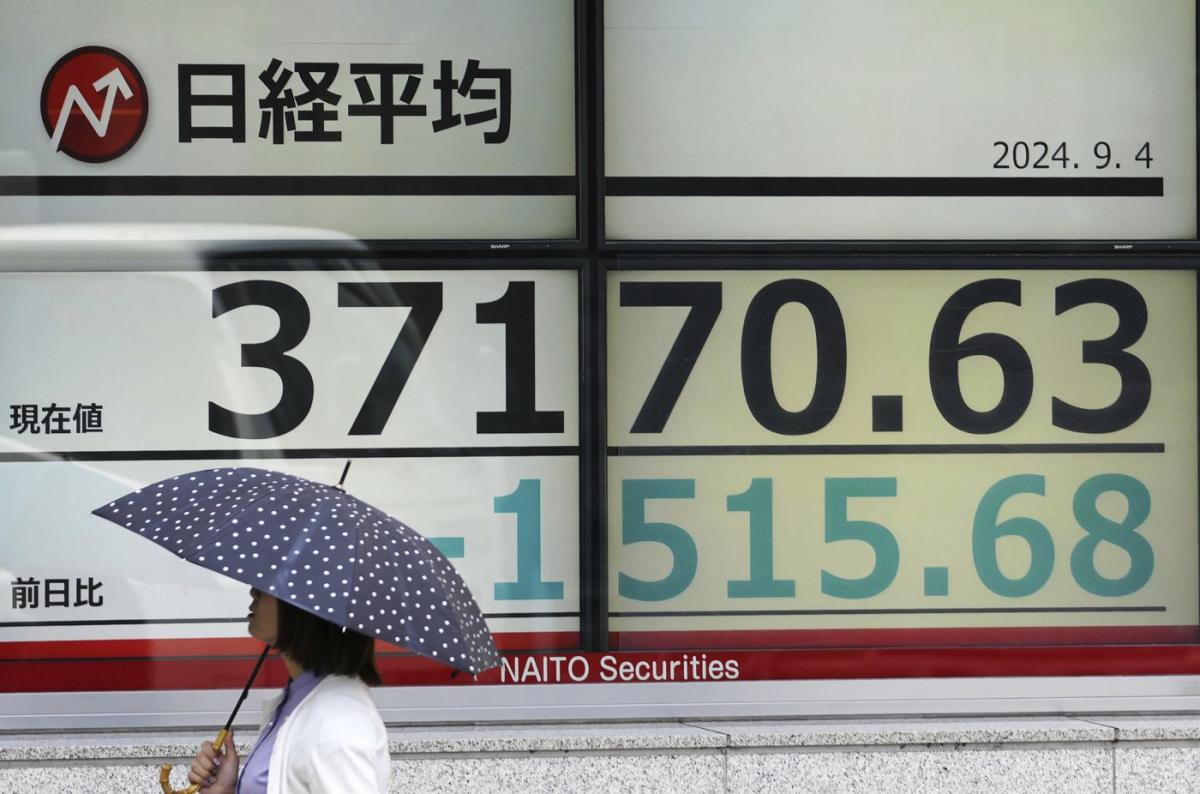HONG KONG (AP) — Asian stocks tumbled Wednesday after Wall Street had its worst day since early August, with the heavyweight Nvidia falling 9.5%, leading to a global decline in chip-related stocks.
Japan’s benchmark Nikkei 225 lost 3.8% to 37,211.09, leading losses in Asia. Electronics and semiconductor company Tokyo Electron slumped 7% in morning trading. South Korea’s Kospi was down 3.0% to 2,584.81, with tech giant Samsung Electronics dropping 3.1%. Taiwan’s Taiex lost 4.0%, dragged down by the heavyweight Taiwan Semiconductor Manufacturing Company, which was 4.7% lower.
Australia’s S&P/ASX 200 was down 2.1% to 7,933.40 after Wednesday data showed the country’s GDP grew by 1% compared to the second quarter of 2023, slightly above experts’ forecast. Hong Kong’s Hang Seng index declined 1.1% to 17,462.25 and the Shanghai Composite index shed 0.5% to 2,789.39.
U.S. futures were lower. Rising oil supply was driving down prices, as Libya moved closer to resolving a conflict over control of the country’s oil revenue that meant its oil production may soon increase.
Benchmark U.S. crude fell 45 cents to $69.89 a barrel. Brent crude, the international standard, lost 42 cents to $73.33 a barrel.
Growing worries about China’s economy — the world’s largest importer of crude oil — also amplified doubts about future oil demand, especially after the recent release of weak data, which was dragged down by a real estate slump and weak consumption.
The S&P 500’s heaviest weight, Nvidia, fell 9.5% on Tuesday. Its stock has been struggling even after the chip company topped high expectations for its latest profit report. The subdued performance could bolster criticism that Nvidia and other Big Tech stocks simply soared too high in Wall Street’s frenzy around artificial-intelligence technology. Global semiconductor-related stocks declined on Wednesday.
On Tuesday, the S&P 500 sank 2.1% to give back a chunk of the gains from a three-week winning streak that had carried it to the cusp of its all-time high. The Dow Jones Industrial Average dropped 626 points, or 1.5%, from its own record set on Friday before Monday’s Labor Day holiday. The Nasdaq composite fell 3.3% as Nvidia and other Big Tech stocks led the way lower.
Treasury yields also stumbled in the bond market after a report showed U.S. manufacturing shrank again in August, sputtering under the weight of high interest rates. Manufacturing has been contracting for most of the past two years, and its performance for August was worse than economists expected.
“Demand remains subdued, as companies show an unwillingness to invest in capital and inventory due to current federal monetary policy and election uncertainty,” said Timothy Fiore, chair of the Institute for Supply Management’s manufacturing business survey committee.
Other reports due later this week could show how much help the economy needs, including updates on the number of job openings U.S. employers were advertising at the end of July and how much U.S. services businesses grew last month. The week’s highlight will likely arrive on Friday, when a report will show how many jobs U.S. employers created during August.
All told, the S&P 500 fell 119.47 points to 5,528.93. The Dow dropped 626.15 to 40,936.93, and the Nasdaq composite sank 577.33 to 17,136.30.
In the bond market, the yield on the 10-year Treasury fell to 3.84% from 3.91% late Friday. That’s down from 4.70% in late April, a significant move for the bond market.
In currency trading, the U.S. dollar was nearly unchanged at 145.48 Japanese yen. The euro cost $1.1054, up from $1.1043.
___
AP Business Writer Stan Choe contributed.
Zimo Zhong, The Associated Press

